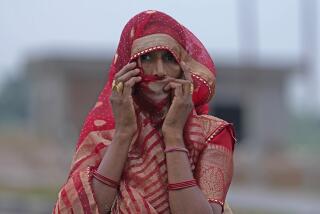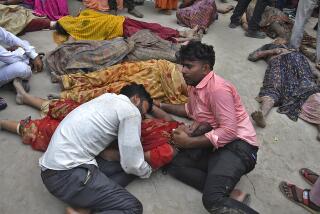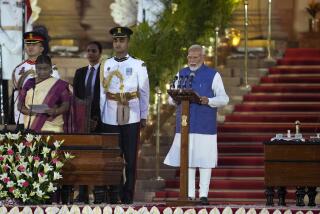Bombings hit Indian city but fail to stop massive political rally
NEW DELHI -- Several small bombs killed five people and wounded 98 Sunday in the northern Indian city of Patna, officials said, hours before the main opposition candidate for prime minister was due to address a massive political rally.
After seven homemade bombs went off, there reportedly was a brief period of panic among some of the hundreds of thousands of people gathered to see Narendra Modi, the controversial leader of the Hindu nationalist Bharatiya Janata party.
However, the rally went ahead, and Modi, the longtime chief minister of western Gujarat state, made no mention of the blasts during his speech, focusing instead on attacking the ruling Congress Party-led government.
Modi, a leading opposition politician who has fought a fierce national campaign to displace the current government in next year’s elections, condemned the blasts a short time later in a Facebook posting.
The first bomb went off around 9:15 a.m. in the toilet of a railway station, said Abhayanand, director-general of police for northern Bihar state, who only uses one name. This was followed by six more, most at the large field where the rally was held. Police also said they recovered four unexploded bombs, which local media reported appeared to be made with ammonium nitrate -- a key ingredient in fertilizer -- along with nails and a timer.
Television images showed white smoke billowing out from behind the red-and-white podium later used by Modi to address the crowd. Security vehicles in front of a police station were shown after they had been vandalized by protesters angry over the perceived security shortfall.
“All the bombs produced low-intensity blasts,” Manu Maharaj, Patna’s district police chief, told reporters at the Patna railway station. “An anti-sabotage team is investigating what happened.”
Police said they arrested at least one suspect trying to flee. Police in India often face enormous pressure to find a suspect within hours of a high-profile crime, particularly when it appears to be politically motivated.
Dr. Amar Kant Jha, superintendent at Patna Medical College, said postmortems were being conducted on the five bodies. None of the 98 injured were seriously hurt, and many were discharged after receiving basic first aid, he added.
Prime Minister Manmohan Singh, in a statement issued by his office, condemned the violence and appealed for calm.
Nitish Kumar, the chief minister of Bihar and a political rival of Modi, told reporters that security was stepped up for the rally and that the state has little history of political conspiracies. The coordinated blasts appeared to be planned and designed to disrupt law and order, he said, adding that each family of the deceased would receive $8,000 in compensation.
Officials said India’s National Investigating Agency and the National Security Guard, a counter-terrorism force, had initiated an investigation.
Modi’s swing through Bihar had been on the radar since Kumar cut ties with the main opposition party six months ago in protest over Modi’s candidacy. Kumar has questioned Modi’s ability to lead Indians of all religions and creeds, and has suggested that Modi could worsen tensions between Hindus and Muslims in India. On Sunday, Modi called him a traitor for his turnaround.
Modi has been accused of ignoring -- even fanning -- mob violence against Muslims in Gujarat in 2002 that led to hundreds of deaths, an allegation he has denied. He is on a State Department list of restricted travelers to the U.S. for allegedly fanning religious intolerance.
But in an apparent attempt to blunt his controversial reputation and to appeal to centrist voters, Modi called on “my Muslim brothers” to follow his leadership, which he said had allowed Muslims in Gujarat to become far more economically prosperous than in impoverished Bihar.
“Our government will have only one religion: India First, nation first,” he said.
He also slammed the government for being insensitive to inflation and the needs of ordinary Indians. “I used to sell tea on trains,” he said. “I know more about the problems of the railways than the rail minister does. ... We have lived through poverty, we understand it.”
ALSO:
U.S. negotiator in nuclear talks assures Iranians she’ll be fair
Saudi officials set up roadblocks against women’s ‘drive-in’ protest
Egypt crackdown complaint against Nobel laureate tossed out by judge
mark.magnier@latimes.com
Tanvi Sharma in the New Delhi bureau contributed to this report.
More to Read
Sign up for Essential California
The most important California stories and recommendations in your inbox every morning.
You may occasionally receive promotional content from the Los Angeles Times.










